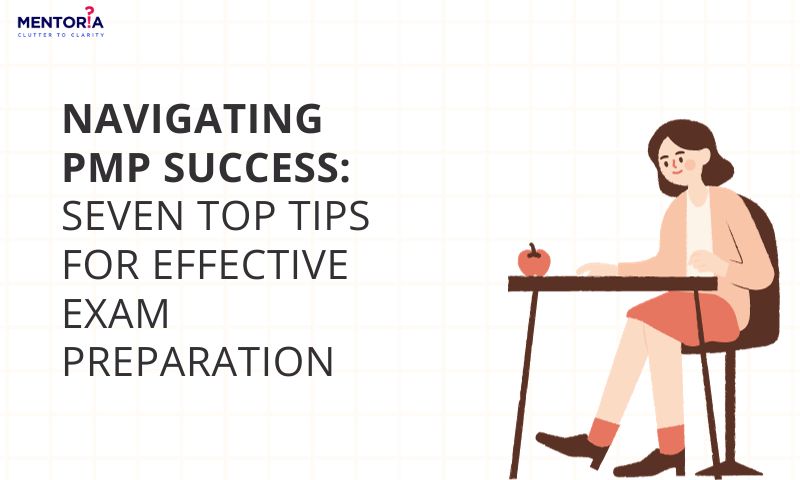Navigating PMP Success: Seven Top Tips for Effective Exam Preparation

A voyage to pass the Project Management Professional (PMP) test is comparable to setting sail into a sea of chances and difficulties. The journey through this scholastic odyssey requires not just perseverance but also a calculated strategy that can make the experience profitable and rewarding. The seven crucial recommendations we provide in this book will help you ace the PMP exam and feel prepared and in control on test day.
It takes more than memorisation of facts and figures to successfully prepare for the PMP exam; you also need to comprehend the nuances of project management and know how to use them. Let’s look at key tactics to help you succeed in your preparation and get you started in the correct direction. These pointers will assist you in setting a course for success on the PMP test, whether you are an experienced project manager trying to prove your abilities or an aspiring professional looking to dive into the world of project management. So, grab your compass and join me as we set out on this PMP exam excursion!
Recognise the Format and Subject Matter of the Test
Learn the format of the PMP exam, including the number of questions, the time allocated, and how the questions are distributed across the several subject areas. Recognise the subjects and areas you should concentrate on by reading through the content outline given by the Project Management Institute (PMI). Your study strategy will be guided by this fundamental understanding.
The exam is a comprehensive test that consists of multiple-choice questions. Each question has four answer options, making it crucial for test-takers to carefully analyse and select the correct answer. This exam is designed to assess an individual’s knowledge and understanding of project management concepts and principles. The duration of the PMP exam is four hours, allowing candidates ample time to answer all the questions. However, it’s important to manage time effectively to ensure all questions are addressed within the given timeframe. The number of questions on the PMP exam can vary, but typically it includes 180 questions. These questions are distributed across five domains, which are based on the PMP Exam Content Outline. The domains include initiating, planning, executing, monitoring and controlling, and closing. Each domain represents a specific percentage of the exam, with initiating comprising 13%, planning 24%, executing 31%, monitoring and controlling 25%, and closing 7%.
Make a Comprehensive Study Plan
Create a well-organised study schedule that allows you to spend enough time on each exam domain while covering all of it. Divide your study sessions into reasonable portions, allotting a certain amount of time to each subject. To keep on course, set realistic benchmarks and assess your progress frequently.
Once you have determined your target date for taking the PMP exam, it’s important to evaluate your existing knowledge and experience in project management. This will help you identify your strengths and weaknesses, allowing you to focus your preparation efforts effectively. Next, gather all the necessary study materials, such as PMP exam prep books, official PMI resources, online courses, and practise exams. Make sure they align with the latest PMP exam content, as this will ensure you are studying the most relevant information.
To better understand the domains, tasks, and knowledge areas covered in the exam, review the PMP Exam Content Outline. Break down the content into manageable sections, which will make studying more organised and efficient. Creating a detailed study schedule is crucial for effective preparation. Allocate specific time slots each day or week for studying, and be consistent in sticking to your schedule. Remember to incorporate short breaks during your study sessions to avoid burnout. Additionally, set milestones based on domains or knowledge areas to track your progress. Choose study techniques that work best for you. Start by reading study materials and taking notes. Solve sample questions and practise exams to reinforce your knowledge. Visual aids, such as mind maps or flowcharts, can be helpful in clarifying complex concepts. Consider joining study groups or online forums for discussions and peer support.
Lastly, keep track of your progress and adjust your study plan as needed. Regularly check if you are meeting your milestones and learning goals. With adequate time and a well-structured study plan, you will be better prepared for success in the PMP exam.
Use Reliable Study Tools
Spend money on high-quality study tools, such as books written by PMI. To further understand the ideas and determine your exam readiness, look for credible training companies that provide in-depth study guides and practise questions. Utilise a variety of resources to confirm that you comprehend the exam’s subject matter.
Official PMI Resources: Start with official materials provided by the Project Management Institute (PMI), such as the PMBOK Guide (Project Management Body of Knowledge) and the PMP Exam Content Outline. These are the primary sources for PMP exam content and should be your foundation.
Reputable PMP Prep Books: Invest in well-regarded PMP exam prep books authored by experienced professionals or endorsed by PMI. These books often provide comprehensive explanations, practise questions, and exam tips.
Online Courses: Enrol in accredited online PMP exam preparation courses. Many reputable organisations and educational institutions offer these courses, which often include video lectures, interactive content, and practise exams.
Active Learning and Application
Memorisation of the study contents alone won’t be sufficient. Active learning activities include answering practise questions, taking practise tests, and taking part in group discussions. Applying the principles you’ve leParticipate in interactive study sessions where you actively ask questions, discuss ideas, and provide explanations of concepts to others or yourself. Actively interacting with the subject aids in reinforcing comprehension and removing any uncertainty.
Using actual situations will help you better understand and remember the exam material. Use real-world examples or projects that you have worked on or are familiar with to apply PMP ideas. This practical approach will help you understand how the theoretical information is used in real-world circumstances, which will improve your comprehension and problem-solving skills.
Join a Study Group
To work with other hopefuls, think about enrolling in a PMP test study group. Discussing ideas, exchanging stories, and working through issues as a group can open up new views and insights. A study group can provide encouragement, hold you accountable, and give you the chance to work through any lingering questions.
Online PMP Forums and Social Media: Start by looking for PMP study groups on online forums, social media platforms like LinkedIn, Facebook, or Reddit, and professional networking sites. Many PMP aspirants and certified professionals create and join study groups on these platforms.
Professional Associations: Check if your local Project Management Institute (PMI) chapter or other professional project management associations offer study groups. They often organise study sessions and support groups for exam candidates.
Ask Colleagues and Peers: Reach out to colleagues, friends, or peers who have taken or are preparing for the PMP exam. They may be aware of local study groups or have recommendations for online groups.
Practise Time Management and Focus on Weak Areas
Managing your time well during the exam is essential. Learn the exam layout and practise answering questions in the allotted amount of time for each section. You can answer all the questions and check your responses before the time runs out by learning to pace yourself. Use practise exams and self-evaluations to pinpoint your weaker areas. Spend more time studying these areas to improve your comprehension and expertise. While having a broad knowledge base across all subject areas is important, focusing on your areas of weakness will increase your self-assurance and exam performance. To effectively prepare for the PMP exam, it is crucial to refer to the official PMP Exam Content Outline. This outline provides valuable information about the weighting of each domain and knowledge area, allowing you to identify the most significant domains. By prioritising these domains, you can focus your efforts on addressing your weak areas.
Once you have identified your weak areas, it is important to devote additional study time to them. This may involve reading specific chapters in your study materials or seeking out additional resources that specifically target those areas. If you find yourself struggling with certain concepts or topics, do not hesitate to seek clarification. Online forums, study groups, and experienced project management professionals can provide valuable insights and help you gain a better understanding. Lastly, it is essential to focus on practise questions related to your weak areas. By answering these questions and reviewing the explanations, you can enhance your understanding of the concepts and improve your problem-solving skills.
Bear in mind that success rests in both the trip and the destination as you set out on the difficult but worthwhile voyage of studying for the Project Management Professional (PMP) exam. The advice offered in this manual acts as a compass, guiding you through the choppy waters of project management knowledge and exam nuances. You give yourself the tools you need to pass this important milestone by comprehending the exam’s structure, creating a well-structured study plan, utilising a variety of reliable study resources, participating in active learning, looking for support from study groups, improving your time management skills, and concentrating on your weaker areas.
Approach your preparation with commitment, fortitude, and a firm conviction in your talents. Keep in mind that passing the PMP exam is a sign of your skill in project management as well as an academic accomplishment. May your perseverance and diligence lead you to success as you embark on your educational journey, and may you hoist the flag of PMP certification high to proclaim your victory in the field of project management. Good luck with your PMP exam journey and may the winds of success be at your back!
Connecting the Divide with Mentoria
Our experts in Mentoria can help you to create a study plan that is tailored to your individual needs and that will help you to stay on track. We can also review your practise exam results and provide you with feedback on your strengths and weaknesses. By prioritising practising over results, students can plan accordingly and prepare keeping in mind their strengths and weaknesses, which will garner good results.









